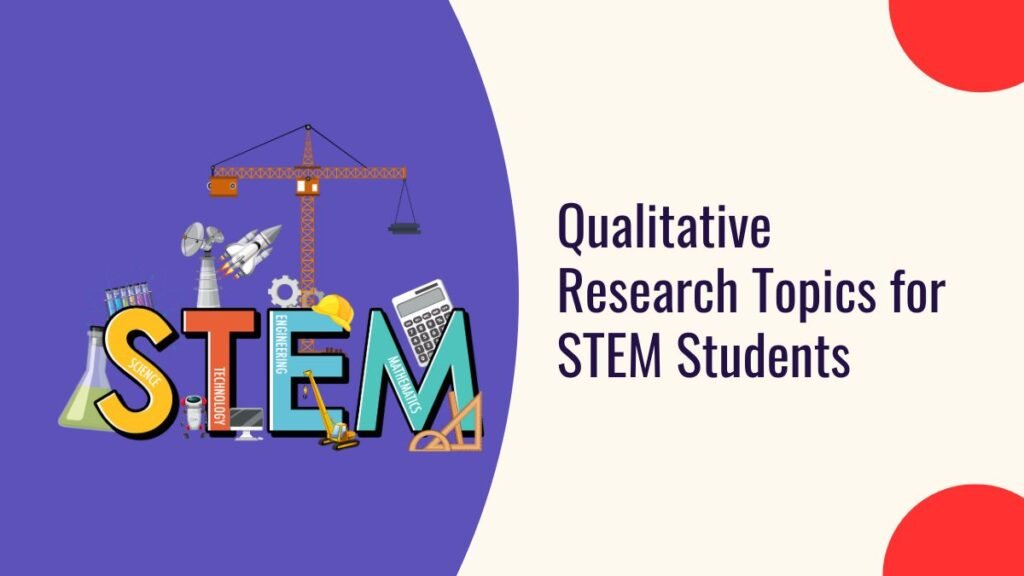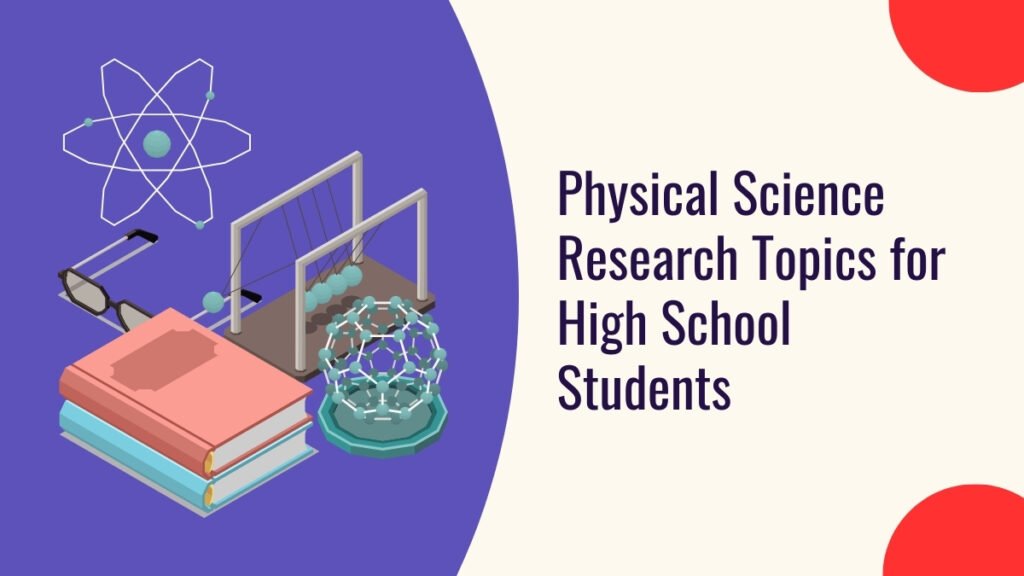Unlock captivating qualitative research topics for STEM students. Dive deeper into the human dimensions of science, technology, engineering, and mathematics, expanding insights into societal impacts and technological innovations.
Curious about how society perceives groundbreaking scientific discoveries or the ethical challenges engineers confront? In STEM disciplines, qualitative research goes beyond mere data points, delving into essential aspects of human experience.
Qualitative research transcends statistics, exploring lived experiences, perspectives, and narratives that shape advancements in science, technology, engineering, and mathematics. For STEM students, it serves as a potent tool to grasp the social and cultural contexts underpinning innovation.
Ready to explore the “why” behind the “what” in STEM? Uncover compelling qualitative research topics that enrich our comprehension of these dynamic fields!
Qualitative Research Topics for STEM Students PDF
Benefits of undertaking qualitative research for STEM students
STEM fields excel in quantitative data, experiments, and mathematical models, but qualitative research adds a crucial human dimension. Here’s how it benefits STEM students:
- Communication Skills: It improves clear expression of ideas, listening to diverse perspectives, and presenting research effectively.
- New Perspectives: Understand societal impacts on science and technology through human experiences and public perceptions.
- User Needs: Learn to design solutions by understanding user motivations and challenges.
- Critical Thinking: Analyze narratives to draw insights and solve complex problems effectively.
- Research Confidence: Gain independence, confidence in presenting findings, and readiness for future research or career paths.
Qualitative research complements STEM’s quantitative focus, preparing students to innovate and communicate effectively in diverse fields.
Qualitative Research Topics for STEM Students
Check out qualitative research topics for STEM students:-
Biology
- Virtual Reality Documentary
- Create immersive VR experiences showcasing global conservation efforts.
- Incorporate stakeholder interviews and interactive storytelling.
- Bioethics Podcast Series
- Produce episodic podcasts discussing ethical dilemmas in genetic engineering.
- Feature interviews with researchers, ethicists, and affected stakeholders.
- Interactive Web Platform
- Develop a website for case studies and discussions on bioethical issues.
- Engage users in debates and collaborative problem-solving.
- Animated Short Films
- Produce animated shorts exploring public perceptions of GMOs in agriculture.
- Use storytelling to educate and foster dialogue on biotechnology.
- Augmented Reality Exhibition
- Design an AR exhibition on biotechnological advancements in healthcare.
- Allow visitors to interact with virtual models and learn from stakeholder insights.
- Community-Based Art Project
- Collaborate with local artists to create installations on marine conservation.
- Reflect community perspectives and environmental challenges through art.
- Documentary Film Series
- Produce a series highlighting diverse marine conservation efforts globally.
- Feature interviews with scientists, policymakers, and community leaders.
- Ethical Debate Forum
- Organize live debates on cloning technologies with experts and the public.
- Facilitate discussions on the ethical implications of genetic research.
- Digital Storytelling Campaign
- Launch a social media campaign sharing personal stories on plant evolution.
- Highlight the importance of biodiversity and ecological dynamics.
- Virtual Symposium
- Host an online symposium on wildlife rehabilitation practices.
- Invite global experts to discuss rehabilitation methods and conservation impacts.
Chemistry
- Virtual Lab Tours
- Develop virtual tours of green chemistry laboratories.
- Showcase innovative practices and environmental impacts.
- Chemical Safety Podcast Series
- Create podcasts discussing chemical safety regulations and public perceptions.
- Include interviews with scientists, policymakers, and community members.
- Interactive Chemistry Education App
- Design an app for sharing effective teaching methods and curriculum insights.
- Engage educators and students in a collaborative learning platform.
- Ethics in Chemistry Board Game
- Develop a board game exploring ethical dilemmas faced by chemists.
- Encourage players to navigate complex scenarios and make ethical decisions.
- Nanotechnology Art Exhibition
- Collaborate with artists to create artworks reflecting public perceptions of nanomaterials.
- Showcase artistic interpretations of scientific concepts in consumer products.
- Chemical Waste Management Simulation
- Create a simulation game on managing chemical waste and pollution.
- Incorporate stakeholder feedback and real-world environmental challenges.
- Water Quality Podcast Series
- Produce podcasts on community attitudes towards water quality testing.
- Discuss management strategies and public health implications.
- Ethical Decision-Making Workshop
- Conduct workshops on ethical issues in pharmaceutical research.
- Facilitate discussions among researchers, ethicists, and industry professionals.
- Materials Science Storytelling Campaign
- Launch a digital campaign sharing narratives on materials science innovations.
- Highlight advancements in materials research and their societal impact.
- Chemical Regulation Virtual Forum
- Organize a virtual forum on policies and regulations affecting chemical safety.
- Foster dialogue among stakeholders on regulatory effectiveness and improvements.
Physics
- Quantum Computing Virtual Reality Experience
- Develop a VR experience exploring quantum computing applications.
- Educate users on quantum principles and their potential societal impacts.
- Space Exploration Ethics Podcast
- Create podcasts discussing ethical challenges in space exploration.
- Feature interviews with astronauts, scientists, and ethicists.
- Renewable Energy Art Installation
- Collaborate with artists to create an interactive art installation on renewable energy.
- Use visual art to depict technological advancements and environmental benefits.
- Physics Education Gamification
- Design a gamified platform for solving physics challenges.
- Incorporate interactive elements and adaptive learning features.
- Particle Physics Documentary Series
- Produce a documentary series profiling particle physics research.
- Share insights from scientists and explore the relevance of particle physics.
- Nuclear Energy Public Debate
- Organize a live-streamed debate on nuclear energy policies and technologies.
- Engage policymakers, scientists, and the public in discussions on energy futures.
- Astrophysics Ethical Dilemma Workshop
- Host workshops on ethical considerations in astrophysical research.
- Use case studies and simulations to explore ethical decision-making.
- Solar Energy Community Art Project
- Create community art installations that celebrate solar energy initiatives.
- Engage local artists and residents in sustainable energy awareness.
- Quantum Mechanics Storytelling Campaign
- Launch a digital storytelling campaign on quantum mechanics.
- Share personal stories and scientific discoveries in an accessible format.
- Space Exploration Funding Symposium
- Organize a symposium on funding priorities in space exploration.
- Discuss investment strategies, public support, and future space missions.
Engineering
- Sustainable Engineering Virtual Showcase
- Create a virtual showcase of sustainable engineering projects.
- Feature interactive case studies and interviews with project teams.
- Robotics in Manufacturing Exhibition
- Design an interactive exhibition on robotics and automation in manufacturing.
- Showcase industry innovations and their impact on production processes.
- AI Ethics Escape Room
- Develop an escape room experience focusing on ethical dilemmas in AI development.
- Challenge participants to solve puzzles based on real-world scenarios.
- Civil Engineering Virtual City Simulation
- Create a virtual simulation of urban infrastructure projects.
- Allow users to design and assess environmental and social impacts.
- Transportation Engineering Community Storytelling Project
- Collaborate with communities to create digital stories on transportation challenges.
- Highlight infrastructure improvements and public transit initiatives.
- Engineering Ethics Role-Playing Game
- Design a role-playing game exploring ethical dilemmas faced by engineers.
- Encourage critical thinking and decision-making in professional scenarios.
- Biomedical Engineering Podcast Series
- Produce podcasts on biomedical engineering advancements and healthcare applications.
- Include interviews with researchers, clinicians, and industry leaders.
- Materials Science Art Installation
- Partner with artists to create an art installation showcasing materials science innovations.
- Use visual art to communicate scientific concepts and technological breakthroughs.
- Environmental Engineering Virtual Symposium
- Host a virtual symposium on ethical considerations in environmental engineering.
- Invite experts to discuss sustainable practices and policy implications.
- Construction Engineering Documentary Series
- Produce a documentary series on construction engineering projects.
- Highlight community impacts, engineering challenges, and innovative solutions.
Mathematics
- Mathematics Anxiety Digital Storytelling
- Launch a digital storytelling platform for sharing experiences with mathematics anxiety.
- Include strategies for overcoming anxiety and promoting mathematical confidence.
- Gender Bias in Mathematics Webinar Series
- Host webinars featuring discussions on gender representation in mathematical research.
- Invite researchers, educators, and policymakers to participate.
- Data Science Ethics Podcast
- Create podcasts exploring ethical issues in data science and analytics.
- Discuss data privacy, bias in algorithms, and ethical decision-making.
- Math Curriculum Interactive Forum
- Develop an online forum for educators to discuss math curriculum effectiveness.
- Encourage collaboration and sharing of best practices in teaching mathematics.
- Mathematical Modeling Community Visualization
- Collaborate with communities to create visualizations of mathematical modeling.
- Illustrate real-world applications and community-driven problem-solving.
- Problem-Solving Strategy Game
- Design a mobile game where players apply mathematical problem-solving strategies.
- Gamify learning and promote critical thinking skills in mathematical contexts.
- Statistics in Policy-Making Virtual Workshop
- Host virtual workshops on using statistics in public policy decisions.
- Facilitate discussions on data-driven governance and policy implementation.
- Actuarial Science Ethics Forum
- Organize online forums for actuaries to discuss ethical dilemmas in risk assessment.
- Explore regulatory frameworks and professional standards in actuarial practices.
- Mathematical Research Trends Storytelling Campaign
- Launch a storytelling campaign on emerging trends in mathematical research.
- Share insights from researchers and highlight breakthroughs in the field.
- Mathematical Literacy Community Engagement
- Engage communities in multimedia projects promoting mathematical literacy.
- Create educational resources and interactive workshops for diverse audiences.
Computer Science
- Cybersecurity Virtual Reality Training
- Develop a VR training program for cybersecurity best practices and simulations.
- Use immersive scenarios to educate users on cyber threats and defense strategies.
- Virtual Reality User Experience Lab
- Create a virtual lab where users test and provide feedback on VR applications.
- Improve usability and user experience based on real-world interactions.
- AI in Healthcare Ethical Dilemma Game
- Design a serious game exploring ethical issues in AI-driven healthcare decisions.
- Challenge players to navigate complex scenarios and ethical considerations.
- Software Development Ethics Podcast Series
- Produce podcasts discussing ethical considerations in software design and development.
- Feature insights from industry experts, developers, and ethicists.
- Social Media Data Privacy Art Installation
- Collaborate with digital artists to create an interactive art installation on data privacy.
- Raise awareness about social media privacy issues through visual storytelling.
- Machine Learning Ethics Simulation
- Develop a simulation where participants explore ethical implications of ML algorithms.
- Analyze decision-making processes and ethical dilemmas in AI applications.
- Human-Computer Interaction Design Challenge
- Organize a design challenge for creating innovative HCI solutions.
- Engage participants in user research, prototyping, and usability testing.
- Cryptocurrency Security Virtual Seminar
- Host a virtual seminar on cryptocurrency security measures and risks.
- Discuss blockchain technology, digital wallets, and cybersecurity best practices.
- IoT Applications Community Engagement
- Collaborate with communities to develop IoT solutions for local challenges.
- Foster innovation and sustainable development through community-driven projects.
- Blockchain Technology Ethics Symposium
- Organize a symposium on ethical considerations in blockchain technology.
- Explore decentralized systems, smart contracts, and governance frameworks.
Environmental Science
- Climate Change Education Virtual Exhibition
- Create a virtual exhibition on climate change science and education.
- Feature interactive displays, multimedia content, and expert insights.
- Urban Sustainability Community Mapping Project
- Collaborate with communities to create digital maps of sustainable practices.
- Highlight urban sustainability initiatives and community engagement.
- Ethics in Environmental Policy Podcast Series
- Produce podcasts discussing ethical dilemmas in environmental policy-making.
- Include perspectives from policymakers, scientists, and environmental advocates.
- Marine Pollution Virtual Reality Experience
- Develop a VR experience on marine pollution and conservation efforts.
- Educate users on marine ecosystems and the impact of pollution.
- Renewable Energy Policy Storytelling Campaign
- Launch a digital campaign sharing stories and case studies on renewable energy.
- Advocate for policy changes and community-driven renewable energy projects.
- Wildlife Conservation Art Installation
- Partner with wildlife artists to create an immersive art installation on conservation.
- Use art to raise awareness about endangered species and habitat preservation.
- Ecosystem Services Community Dialogue
- Organize dialogues on the value of local ecosystem services and conservation.
- Engage stakeholders in discussions on biodiversity and ecosystem management.
- Water Resource Management Simulation Game
- Develop a simulation game on managing water resources and sustainability.
- Explore water conservation strategies and environmental stewardship.
- Ecological Research Ethics Workshop
- Host workshops on ethical considerations in ecological research and field studies.
- Discuss scientific integrity, animal welfare, and community engagement.
- Sustainable Agriculture Digital Storytelling
- Launch a digital storytelling platform on sustainable agriculture practices.
- Share farmer stories, agricultural innovations, and community impacts.
Qualitative Research Topics for STEM Based on Difficulty Level
Check out qualitative research topics for STEM based on difficulty level:-
| Level | Field | Project Idea |
|---|---|---|
| Beginner | Science | Study how students experience specific science lab activities or teaching methods. |
| Technology | Explore user feedback on new educational apps or online learning platforms. | |
| Engineering | Interview engineers about their career paths and challenges they face. | |
| Mathematics | Investigate student perceptions of math anxiety in different learning environments. | |
| Intermediate | Science | Analyze public views on controversial scientific topics through surveys or focus groups. |
| Technology | Research social media’s impact on public trust in science using interviews with experts. | |
| Engineering | Conduct ethnographic research on communities affected by large engineering projects. | |
| Mathematics | Study teacher strategies for fostering a growth mindset in math education. | |
| Advanced | Science | Explore ethical dilemmas in emerging scientific fields like CRISPR using interviews with scientists and policymakers. |
| Technology | Investigate algorithmic bias on social media platforms and its societal implications through document analysis and interviews. | |
| Engineering | Compare the social impacts of engineering projects in different cultural contexts. | |
| Mathematics | Analyze how cultural factors and stereotypes influence student achievement in math using document analysis and interviews. |
Qualitative Research Topics for SETM Based on Grades
Check out qualitative research topics for stem students Based on Grades:-
| School Level | Field | Project Idea |
|---|---|---|
| Elementary School (Grades K-5) | Science | Study how students learn from hands-on science experiments through interviews. |
| Technology | Explore student experiences with educational apps or games and their learning outcomes. | |
| Engineering | Observe how students approach design challenges using recycled materials. | |
| Mathematics | Assess the effectiveness of math tools like counting blocks in early education. | |
| Middle School (Grades 6-8) | Science | Survey student attitudes towards topics like space or climate change. |
| Technology | Examine how social media influences student interest in STEM. | |
| Engineering | Investigate how students view the engineering design process. | |
| Mathematics | Study how middle schoolers handle math anxiety during tests. | |
| High School (Grades 9-12) | Science | Gather public opinions on recent scientific breakthroughs through discussions. |
| Technology | Evaluate the ethics of using wearable tech in education. | |
| Engineering | Analyze community views on local engineering projects. | |
| Mathematics | Research how cultural expectations affect student math choices. |
Choosing the Right Qualitative Research Topic for STEM
Welcome to qualitative research in STEM! Here’s how to find the perfect topic:
Fueling Your Passion
- Interests: Pick what fascinates you most in STEM.
- Real-World Impact: Choose topics connected to real challenges.
Balancing Feasibility
- Time and Resources: Ensure your topic fits your program’s timeframe and resource availability.
- Originality: Aim for a unique angle or application.
Seeking Guidance
- Expert Advice: Collaborate with experienced professors or advisors.
- Literature Review: Explore gaps in existing research.
Refining Your Topic
- Clear Goals: Define your research question and methods clearly.
- Focus: Keep your topic manageable and focused.
Remember: The best topic aligns passion with feasibility and offers a fresh perspective. Enjoy exploring human experiences in STEM!
Conducting Qualitative Research for STEM
You’ve chosen an exciting qualitative research topic in STEM! Here’s how to approach data collection and analysis:
Choosing the Right Method
- Interviews: Talk one-on-one for deep insights.
- Focus Groups: Discuss topics with small groups.
- Ethnography: Immerse yourself in settings for context.
- Document Analysis: Study existing texts for insights.
Ethical Research Practices
- Informed Consent: Explain your research clearly.
- Anonymity and Confidentiality: Keep identities private.
- Respect: Approach participants respectfully.
Data Collection and Analysis
- Interviews/Focus Groups: Use open-ended questions.
- Ethnographic Observation: Take detailed notes.
- Document Analysis: Identify themes and biases.
- Analysis Tools: Use software for insights.
Remember
- Choose methods based on your topic.
- Follow ethical guidelines.
- Analyze data critically.
Bonus Tip
Consider using multimedia for richer findings.
By following these steps, you’ll uncover valuable insights in your STEM research.
Conclusion
Hey there! In STEM, we’re all about pushing boundaries with data and logic. But there’s a whole other side to explore—the human side. Qualitative research lets us dive into the stories, experiences, and viewpoints that shape our scientific breakthroughs and engineering wonders.
When you pick an interesting topic, use the right methods, and stick to ethical guidelines, you can really add something special to your field. Your research could:
- Influence how we teach science, regulate tech, or promote sustainability.
- Tackle tough ethical issues in fields like AI or genetic research.
- Help folks understand science better and get excited about STEM.
So, follow your curiosity, get into qualitative research, and uncover the human stories behind STEM. Remember, the future of STEM isn’t just about what we discover—it’s about how those discoveries touch people’s lives and sharing those stories with the world.



